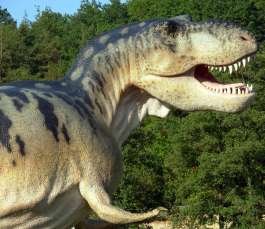The As A Dodo editorial team wish to apologise for the following obituary. We were unaware at the time of commissioning that the staff member assigned to the task had, in fact, worked for BBC television's "Horizon" programme. It is hoped that, given the importance of the obituary, our readers will forgive the style in which it has been drafted. We have left the author's notes in the text, on the grounds that they supply full explanation for his dismissal. Scientists in Britain have made a discovery that will transform life across the planet. More than seventy years after they first appeared, Intelligent Science Programmes have died-out across the country. By the end of 2006 scientists predict that they will all be dead, wiped out by a cataclysm that we have done nothing to prevent ... and the world as we know it will come to an end.
Scientists in Britain have made a discovery that will transform life across the planet. More than seventy years after they first appeared, Intelligent Science Programmes have died-out across the country. By the end of 2006 scientists predict that they will all be dead, wiped out by a cataclysm that we have done nothing to prevent ... and the world as we know it will come to an end.
Intelligent Science Programmes first appeared on Earth in the time of the dinosaurs in about 1936. The terrible lizards (amphibians?), especially the mighty Tyrannosaurus Reith dominated the television world with their dreadful mission to "inform, educate and entertain", forcing the tiny Intelligent Science Programmes to find an ecological niche (term a bit complex for our audience?) where they had to make difficult things understandable to people without patronising them. Little did they know that only seven decades later they would be facing extinction ... and the possible end of the world.
Thanks to the "selective pressure of their environment" (got this from a text book, should we just say Intelligent Design?), Intelligent Science Programmes soon spread throughout the televisual ecosphere (not sure this means anything but it sounds good) to any place where a spark of brightness could be found: QED on BBC1, Horizon and The World About Us on BBC2, Equinox on Channel 4 and Coronation Street on ITV. Vast Intelligent Science Programming beasts soon arose, with giants such as Dr Jacob Bronowski's Ascent of Man and David Attenborough's Life on Earth battling for the attention of the public and The Royal Institution Christmas Lectures threatening to devour the public's children. But already the Programmes' existence was facing a challenge, a challenge that would see Intelligent Science Programmes wiped out ... and the fate of the world in the balance. By the mid 1980's a new breed was beginning to dominate the tellysphere (there, that's even better). With the fundamental rules of commissioning science destroyed by light regulation, increasing TV channels and people with media studies degrees (smug bastards, what's wrong with film and design courses?), soon Intelligent Science Programmes were facing competition from new Stupid Science Programmes, such as "The Boy Whose Anus Ate His Brain", "Could Superman Beat Dracula In A Fight?", "Why Cookery Is Dead Clever", "Science Suntan Holiday" and "Da Vinci's Bible Alien Code: The Truth". Scientists across Britain were worried ... could it mean the end of the world?
By the mid 1980's a new breed was beginning to dominate the tellysphere (there, that's even better). With the fundamental rules of commissioning science destroyed by light regulation, increasing TV channels and people with media studies degrees (smug bastards, what's wrong with film and design courses?), soon Intelligent Science Programmes were facing competition from new Stupid Science Programmes, such as "The Boy Whose Anus Ate His Brain", "Could Superman Beat Dracula In A Fight?", "Why Cookery Is Dead Clever", "Science Suntan Holiday" and "Da Vinci's Bible Alien Code: The Truth". Scientists across Britain were worried ... could it mean the end of the world?
By the early noughties (ooh-er, sounds rude!) Intelligent Science Programmes were dying out. Many were wiped out completely, while others found themselves evolving (could put off the Creationists?) into new forms. By 2006 confirmation that the last Intelligent Science Programme had dumbed down came with the news that the latest edition of Horizon would feature a comedian and TV personality talking to chimpanzees ... and the end of the world.
Intelligent Science Programmes were buried in a late night slot on some obscure channel where they will never be seen. They are survived by the world ... which will be utterly destroyed ... ... in about 7.5 billion years when it is swallowed by the expanding Sun as it becomes a red giant star. (Too clever, dumb down second draft)
05 October 2006
Intelligent Science Programmes on British Television 1936-2006
Subscribe to:
Post Comments (Atom)

0 Comments:
Post a Comment